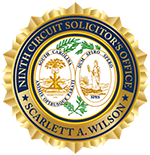Diversion Services - Charleston & Berkeley Counties
The Ninth Circuit Diversion
Services Manager,
Ty Falconer
If you need more general information about our program, you may contact us at DivServices@scsolicitor9.org
Ninth Judicial Circuit Diversion Services are program mandated by State Statute that allows eligible applicants the opportunity to get certain types of pending charges dismissed with successful program completion. This is accomplished for participants without the risk of a criminal record (in PTI, AEP & WCU). The traffic Diversion program (TEP) abolishes the risk of incurring an impaired driving record. All program applicants receive a series of requirements and once successfully completed, charges are eligible for dismissal and expungement. Although created by State Statute, our programs are self-supporting. The Diversion Services programs and staff are under the control and supervision of the 9th Judicial Circuit Solicitor, Scarlett Wilson; our operations are made possible by the cooperation of Judicial, Law Enforcement, and Community agencies. There are two Diversion Services offices in the 9th Circuit. They are located downtown Charleston at 101 Meeting St., 2nd floor Suite 230 and in the Moncks Corner Courthouse at 300 B California Ave. Applicants must apply in the county office where the citation occurred. Cases may be handled locally or out of area. Please see below for more specific information.
If you live outside of the local area, AEP, TEP and PTI applicants may apply for diversion through the mail. PTI may also apply on line. However, if applying to PTI with General Sessions charges, all participants must have a mandatory meeting with their Diversion case manager on site prior to PTI acceptance. All participants can be supervised while living in a different location. Choose the section below for further information.
Notice from the Solicitor
The Ninth Judicial Solicitor's Office has taken a strong position in prosecuting those who threaten our community and break our laws. We recognize, however, that first-time offenders on nonviolent crimes may sincerely wish to turn their lives around, and that we may all benefit from their doing so through our Pretrial Intervention Program (PTI). Our program requires the participant to repay the community and the victim for criminal activity through community service or restitution; to gain an understanding of the judicial system through court observation and prison tours; and to be a productive and responsible citizen. While in PTI, participants must undergo drug treatment or counseling sessions and must submit to random drug testing to ensure their compliance. In return for compliance with all Pretrial requirements participants will be eligible to have all records of their criminal arrest that were referred to the Pretrial Program removed from their record. I urge anyone who is genuinely committed to leading a responsible and productive life in our community to take advantage of an acceptance into PTI.
Scarlett A. Wilson
Solicitor
